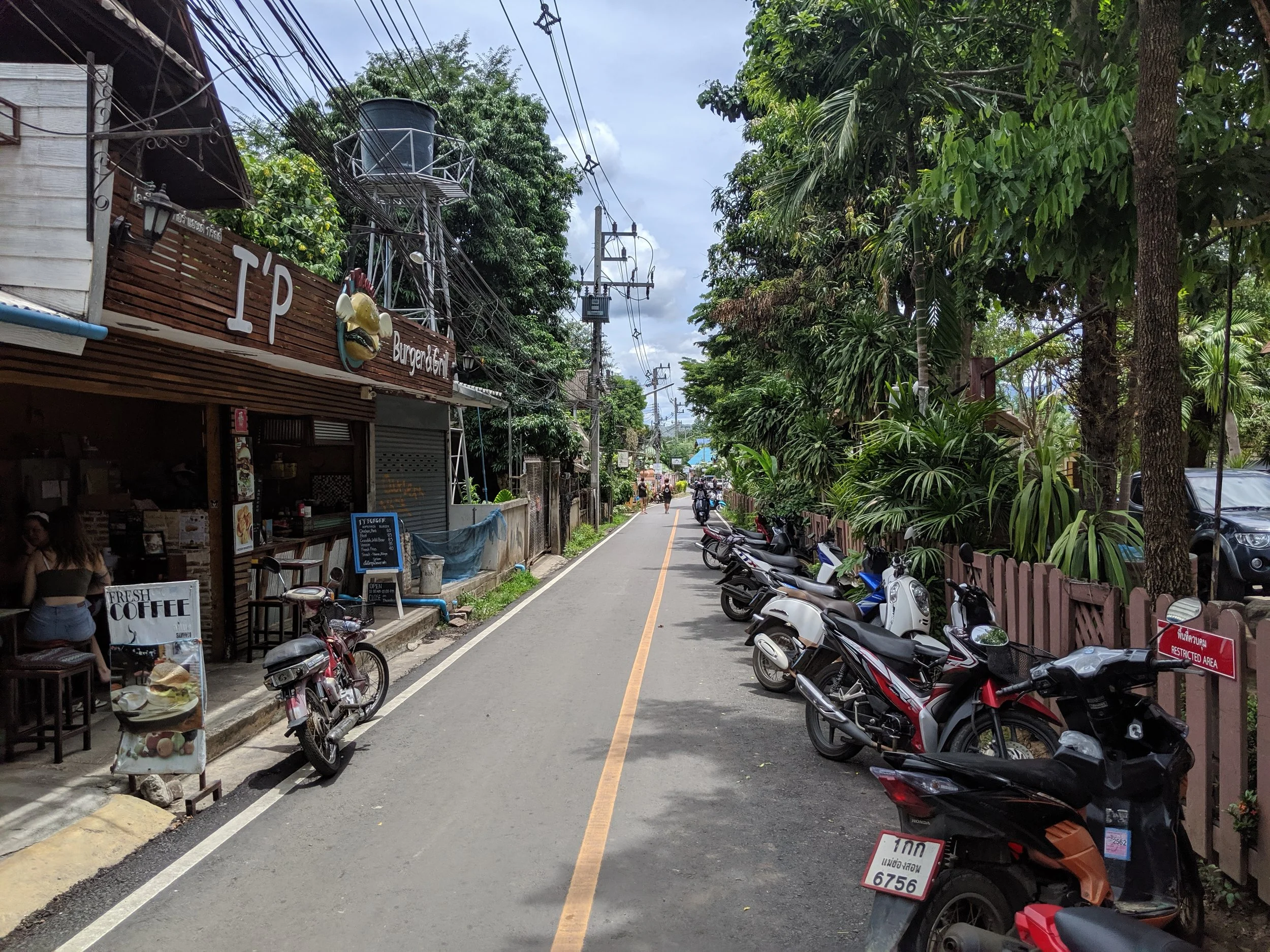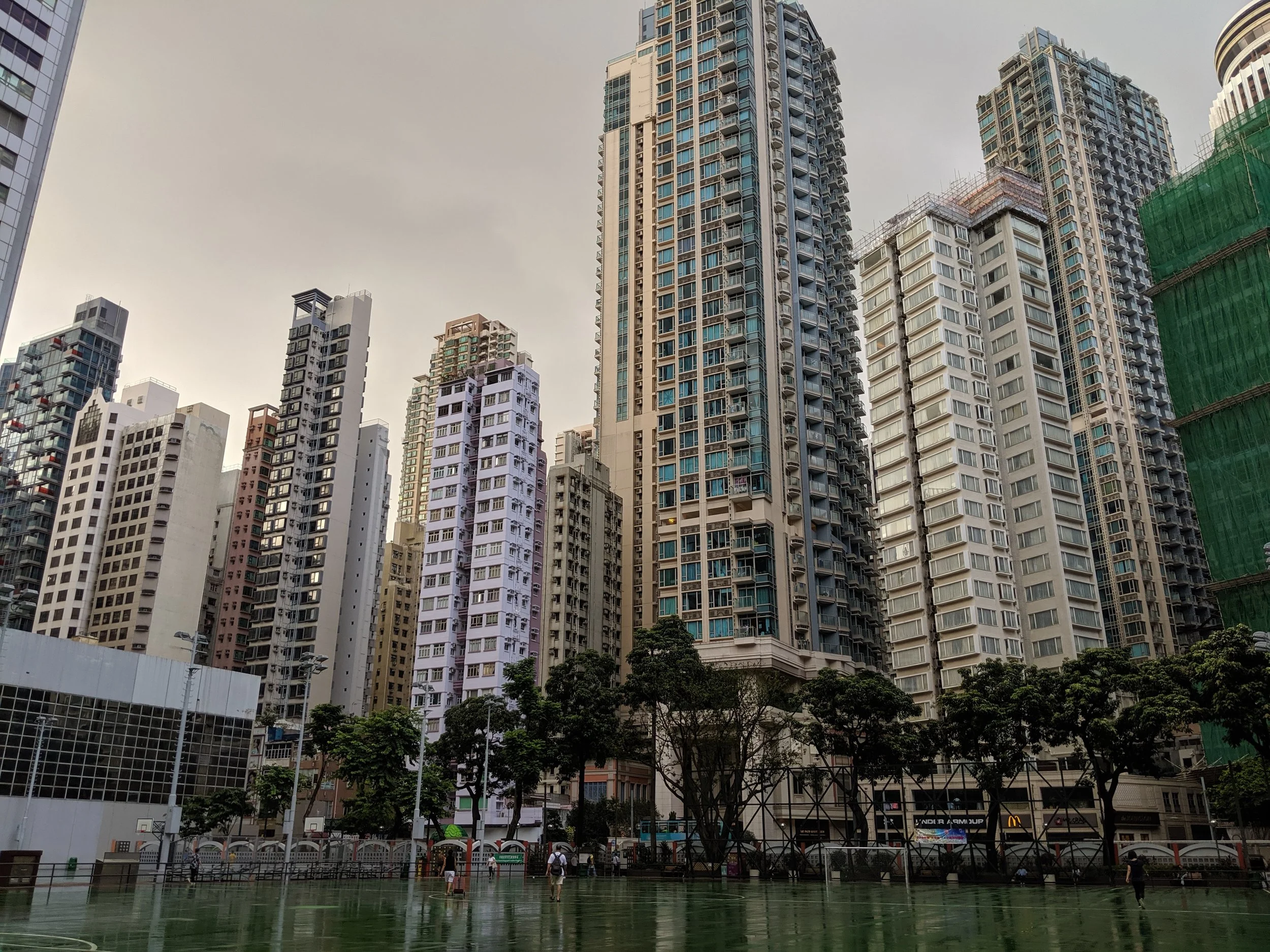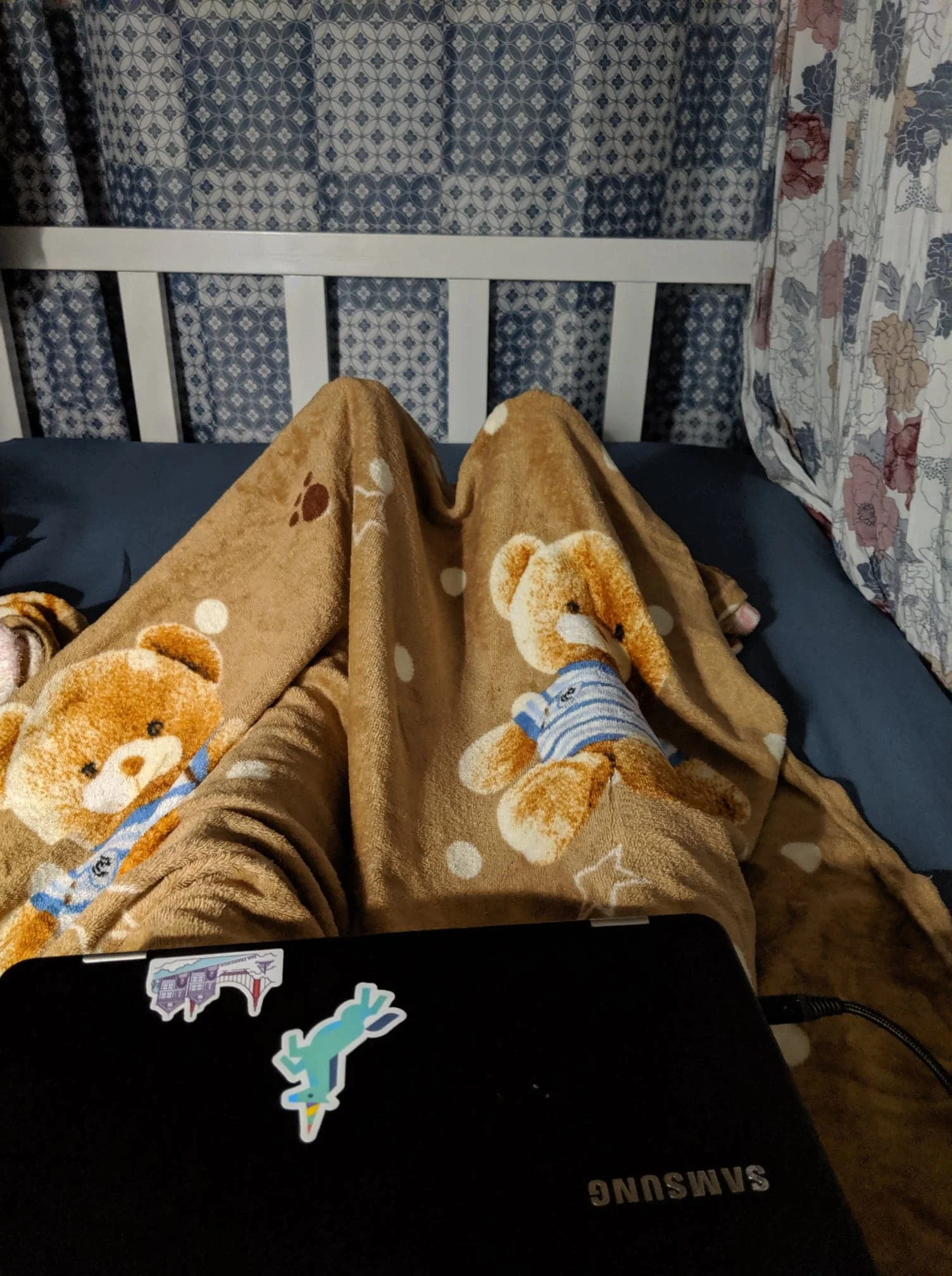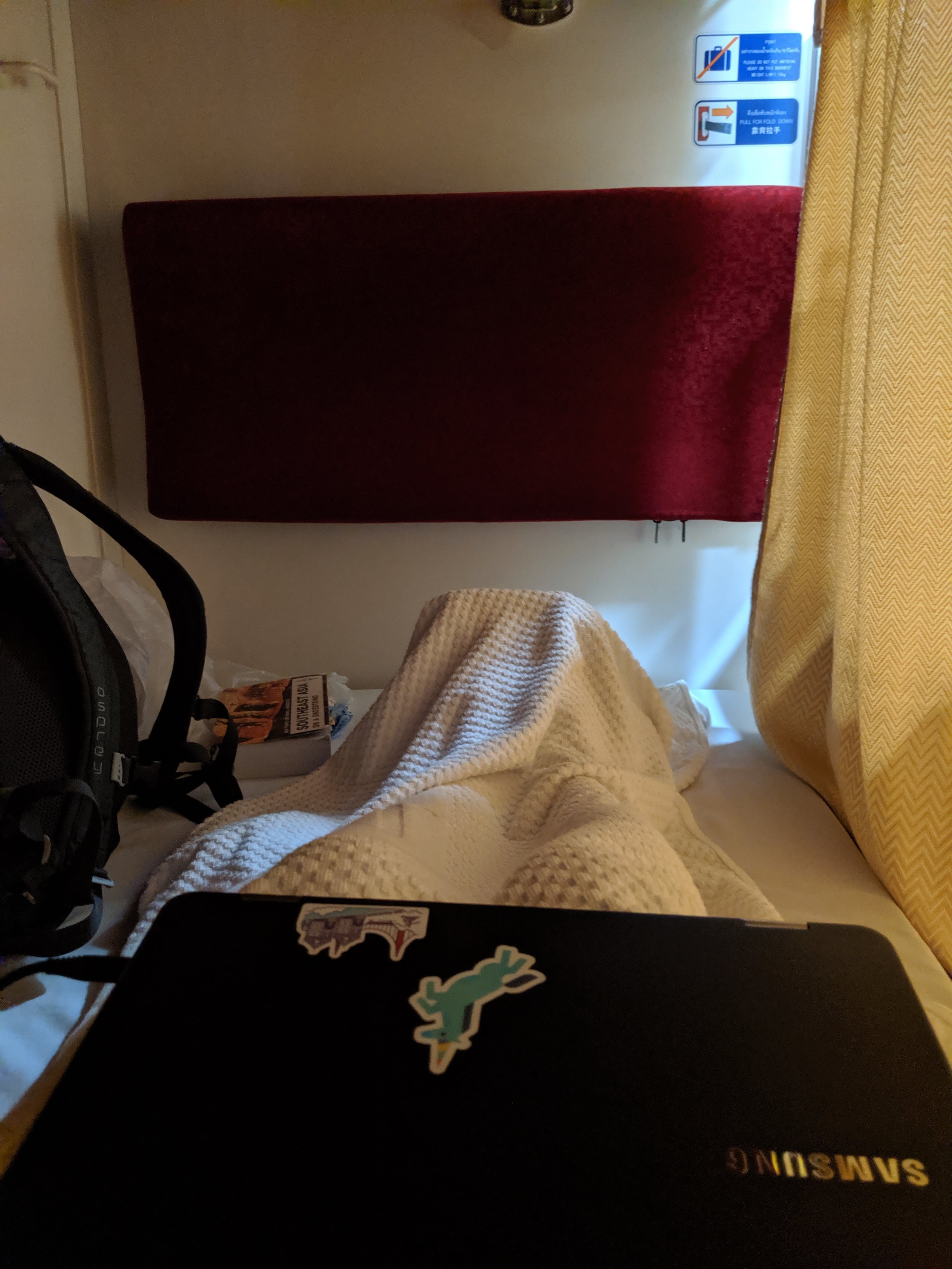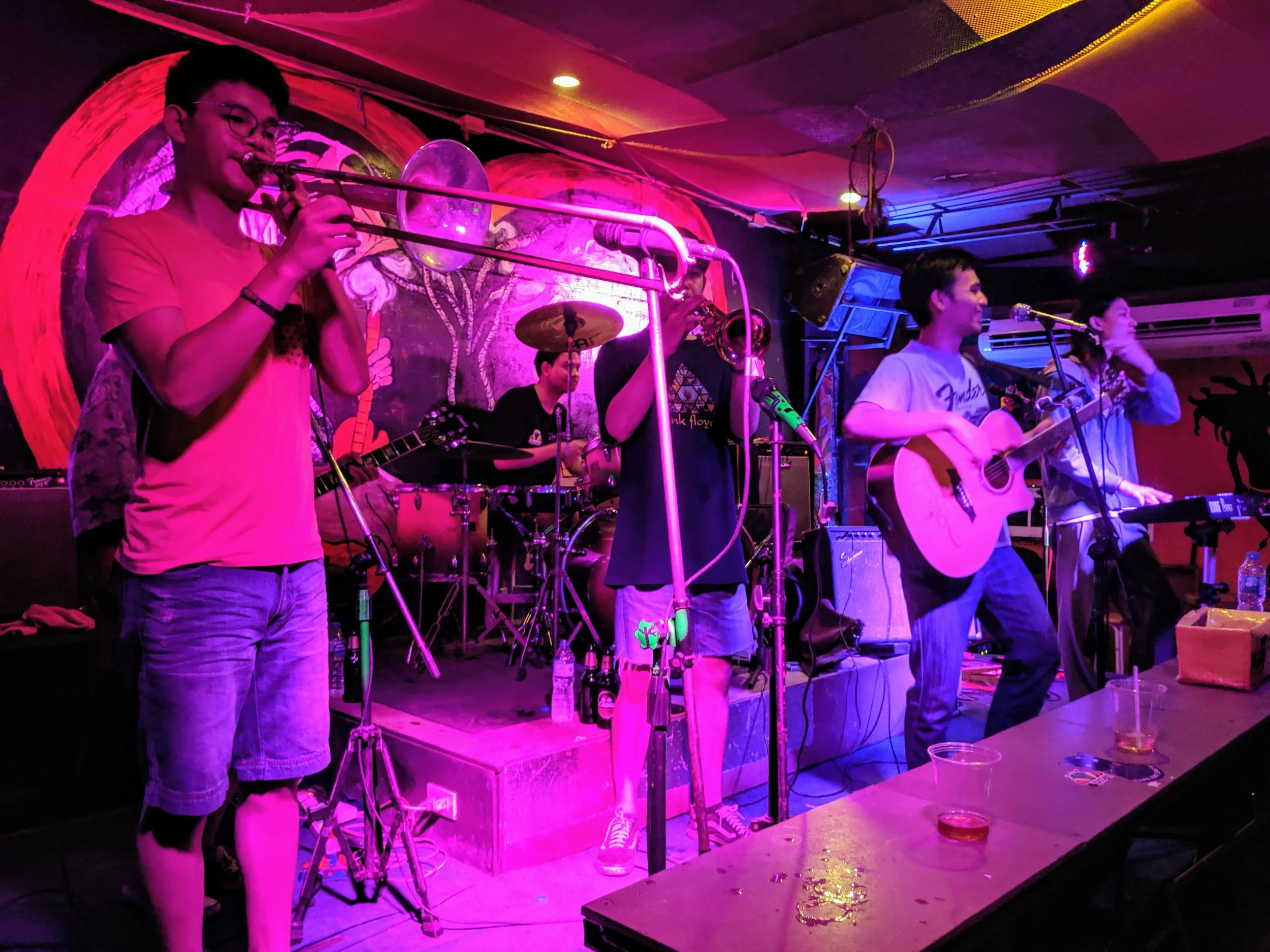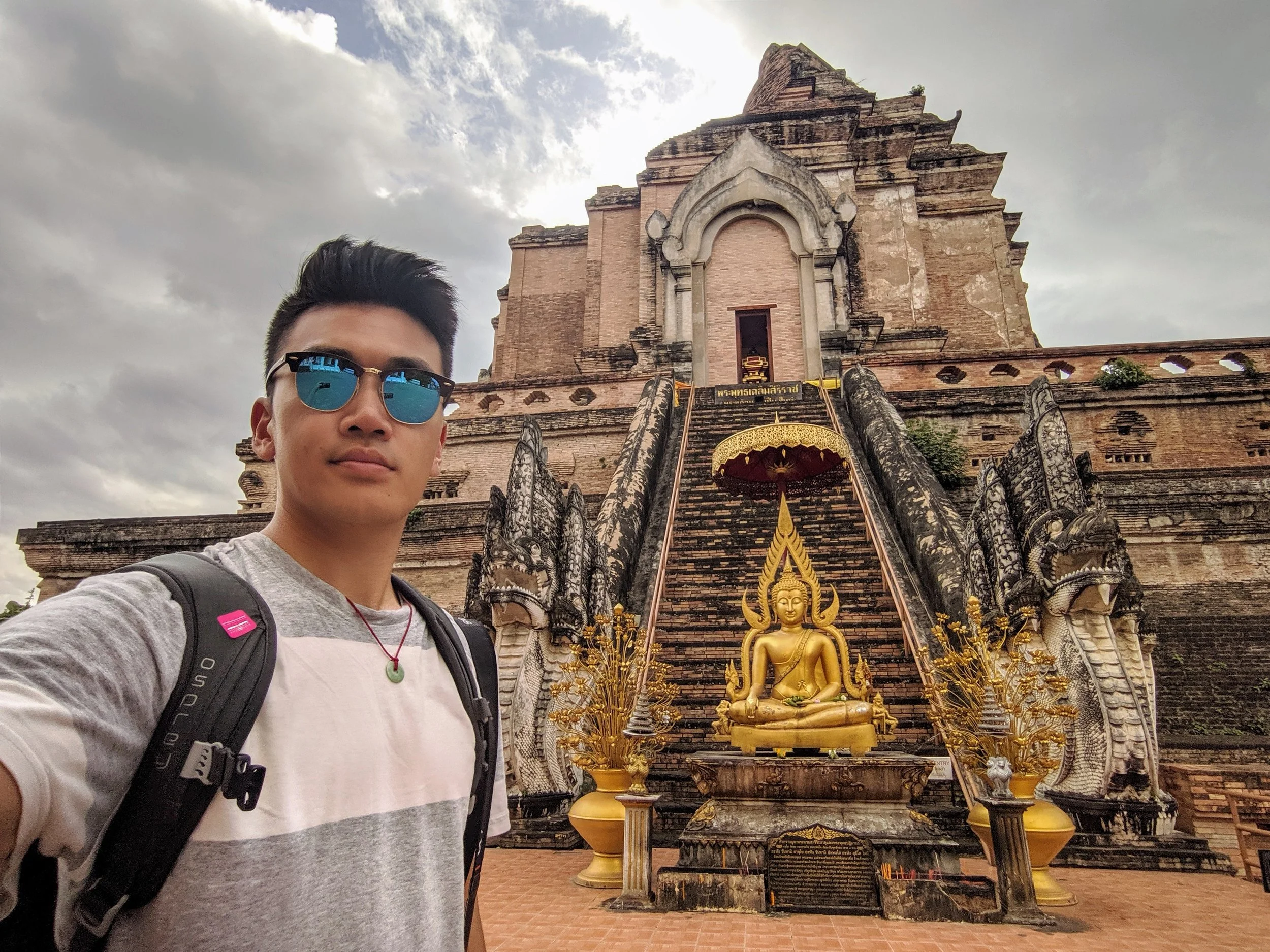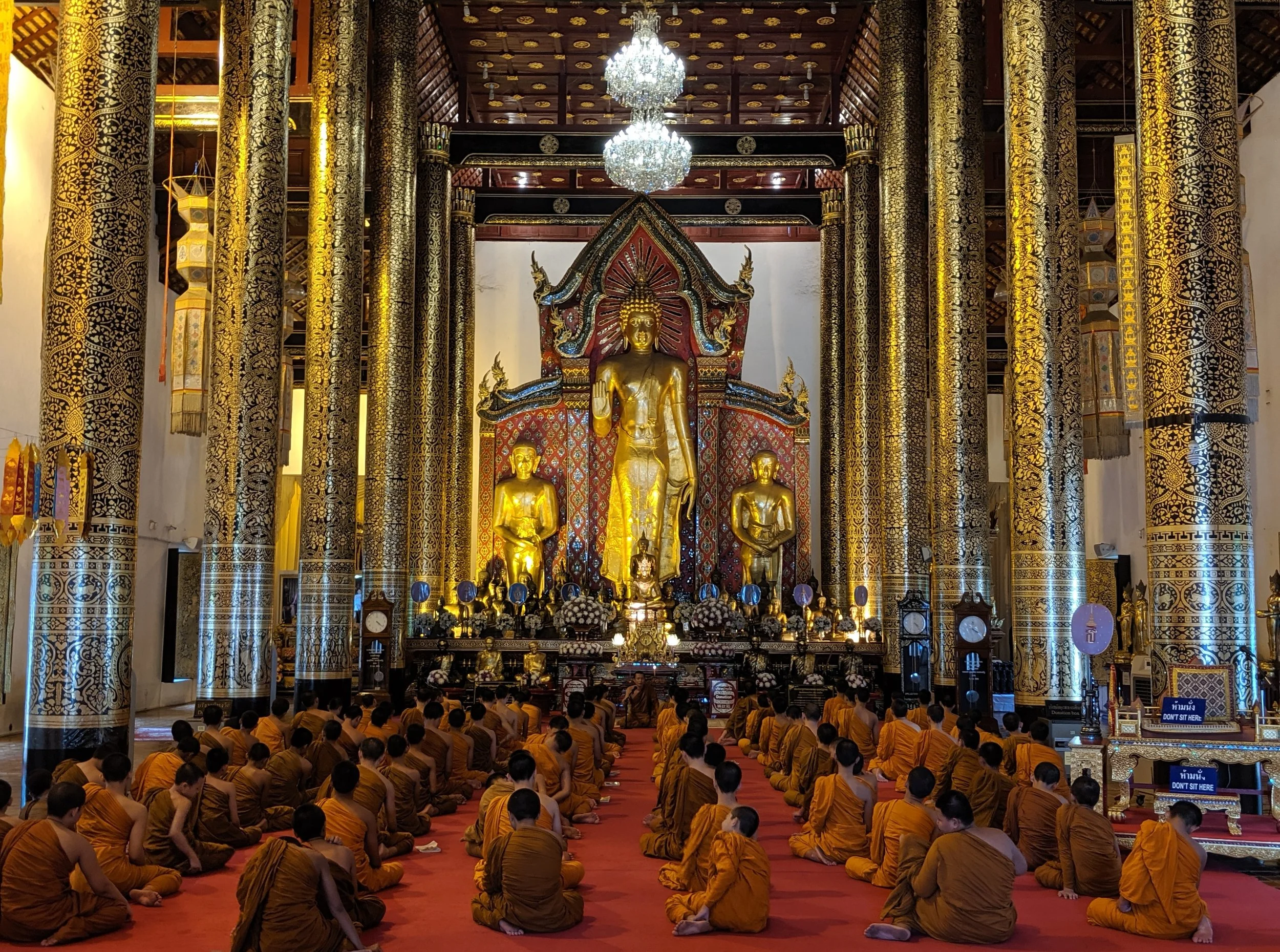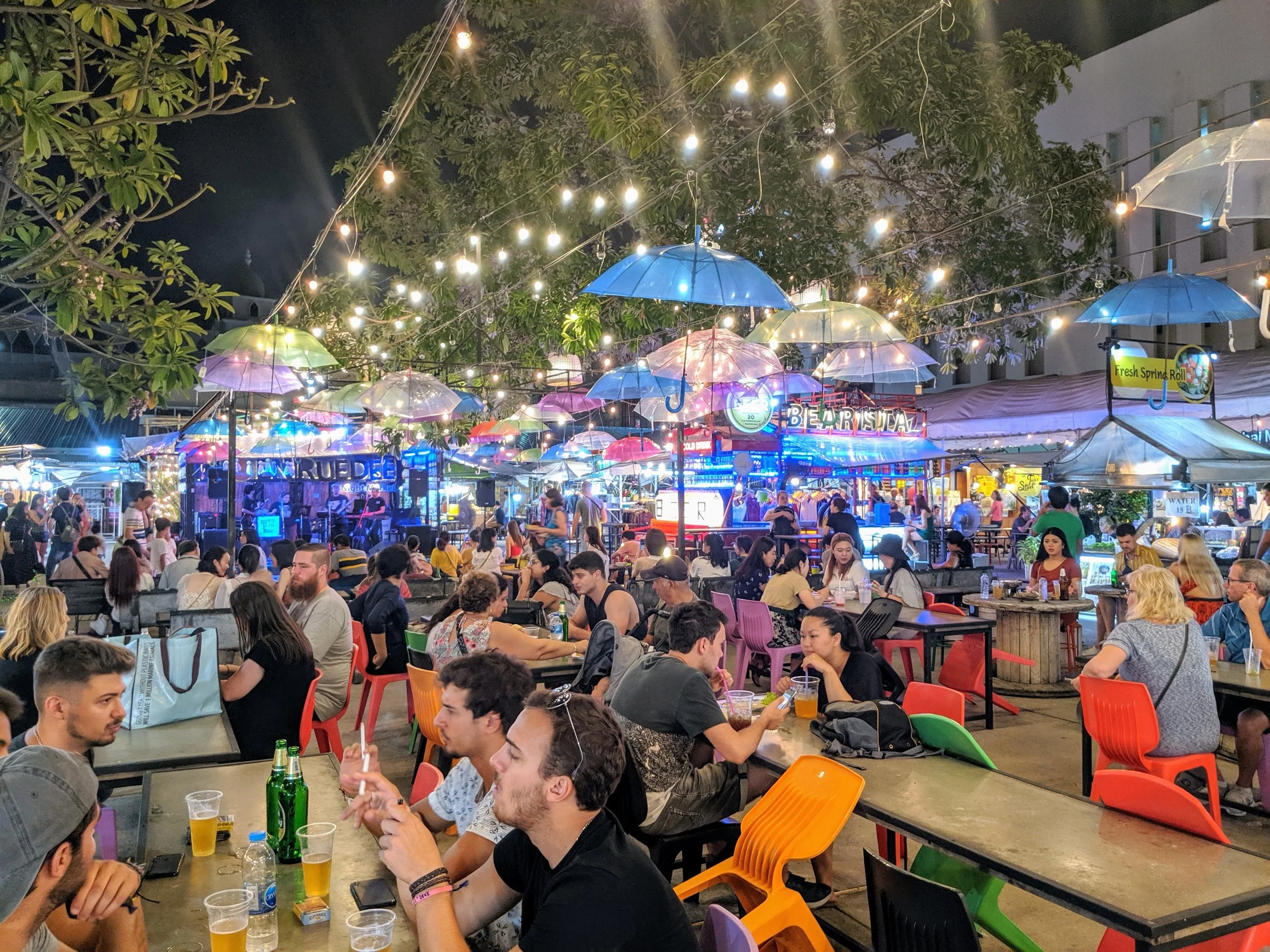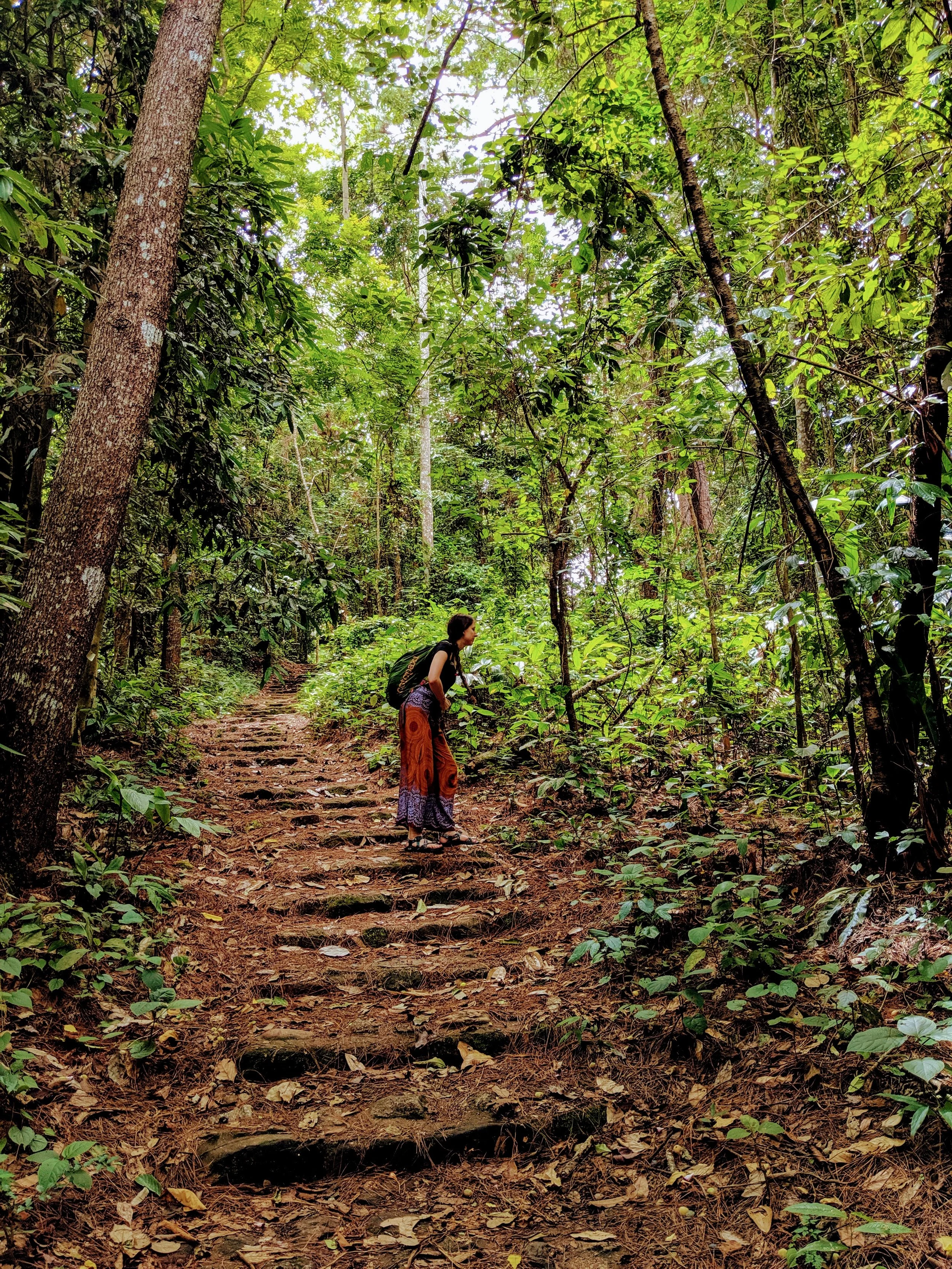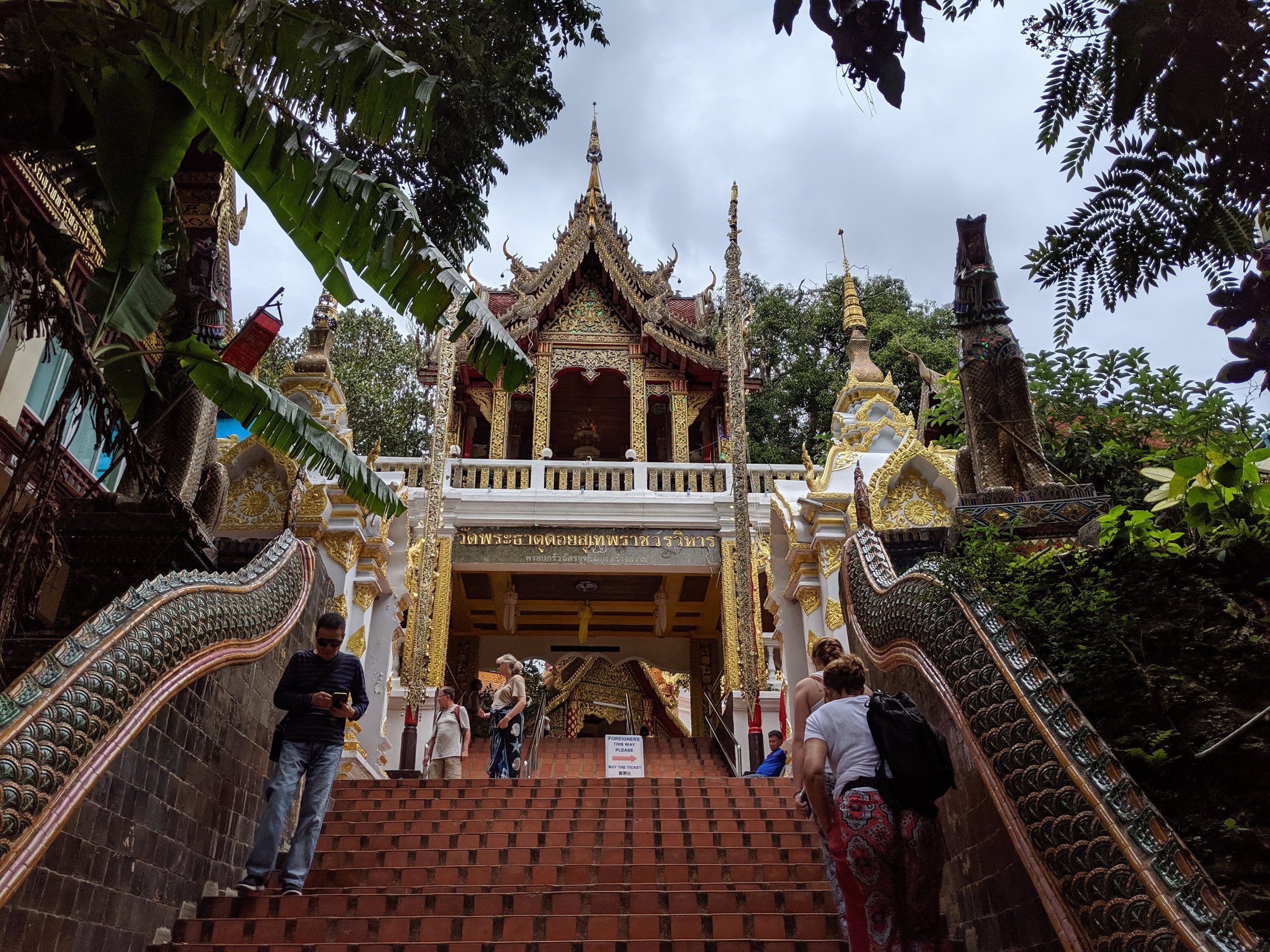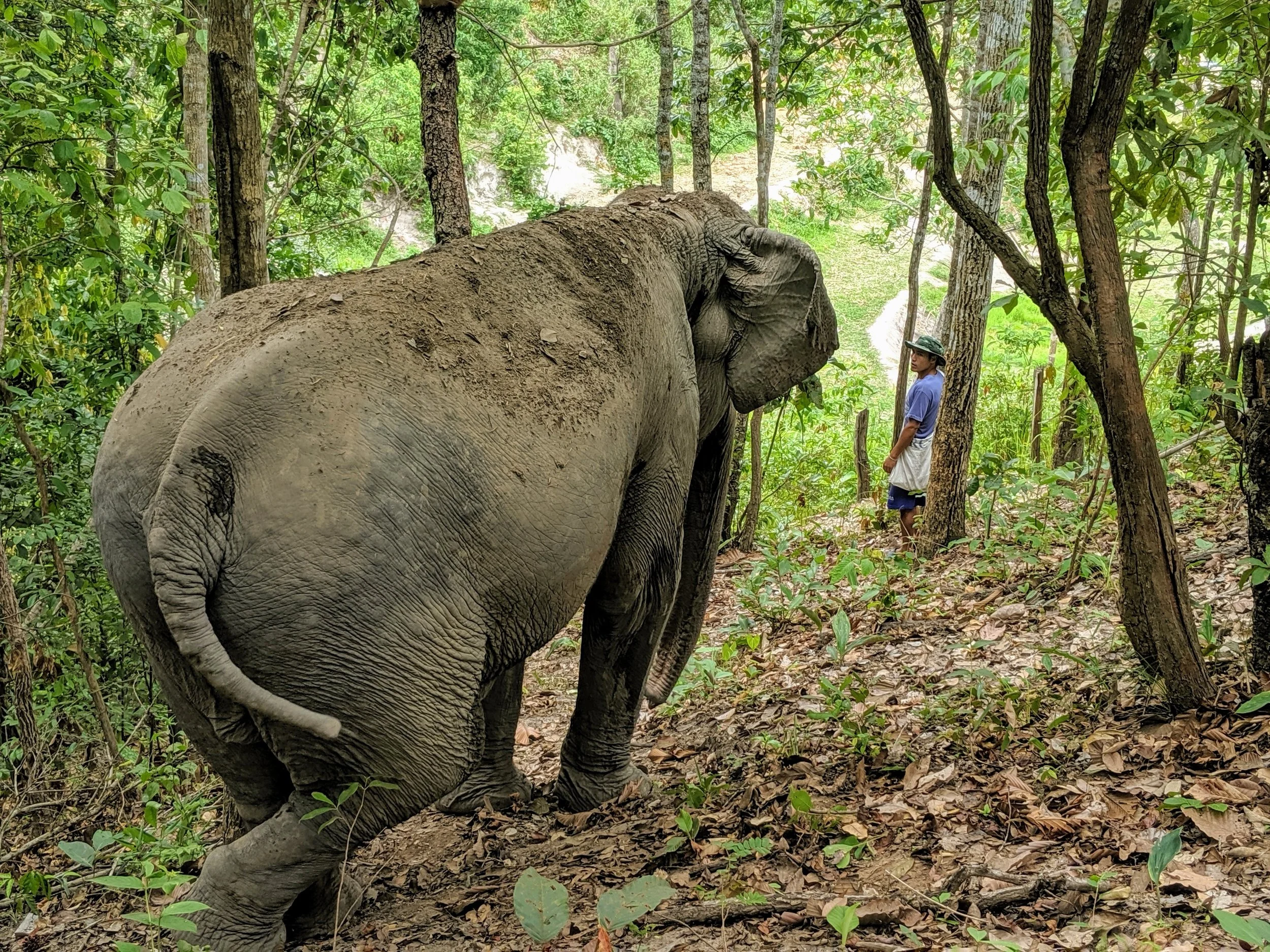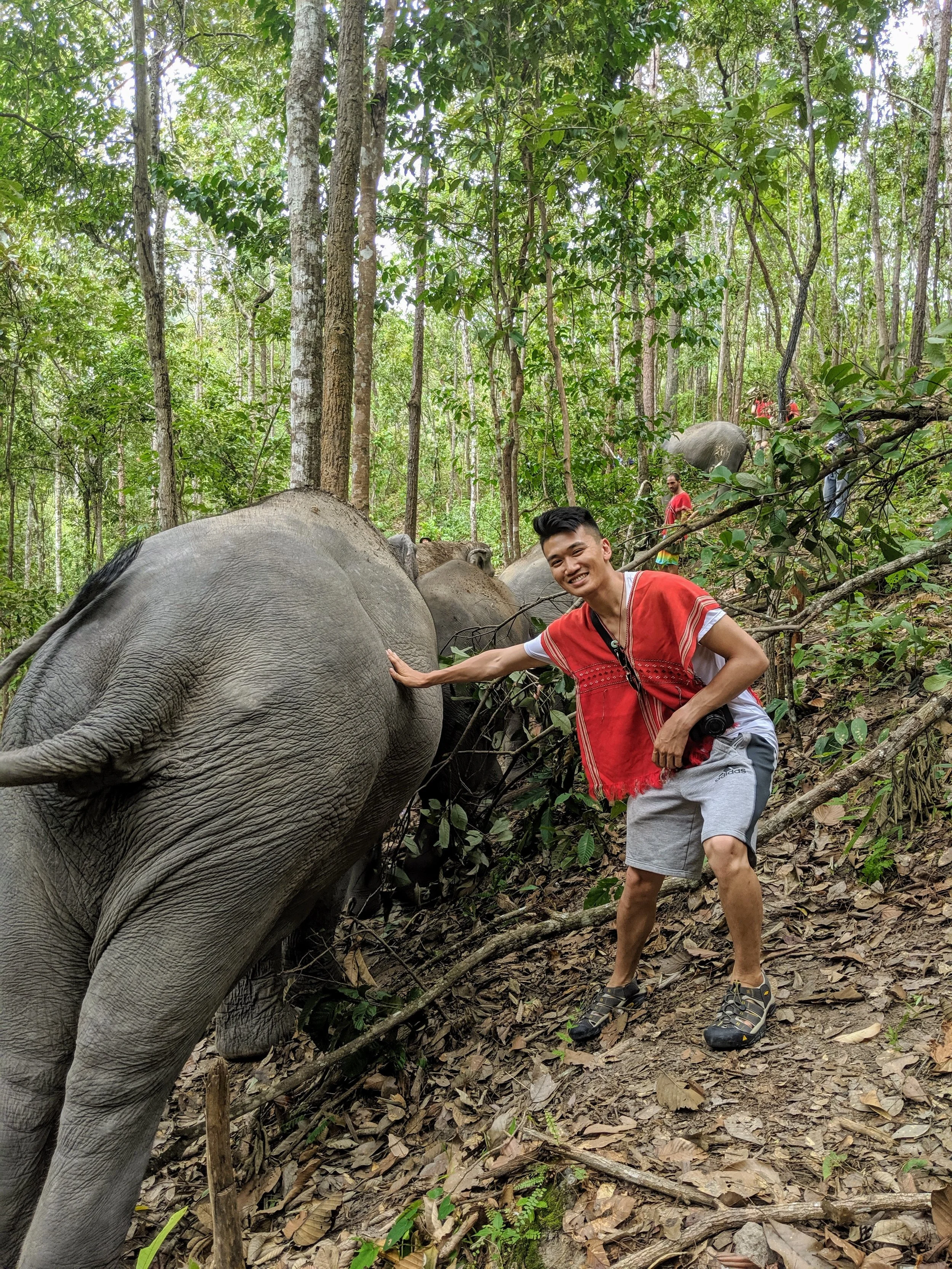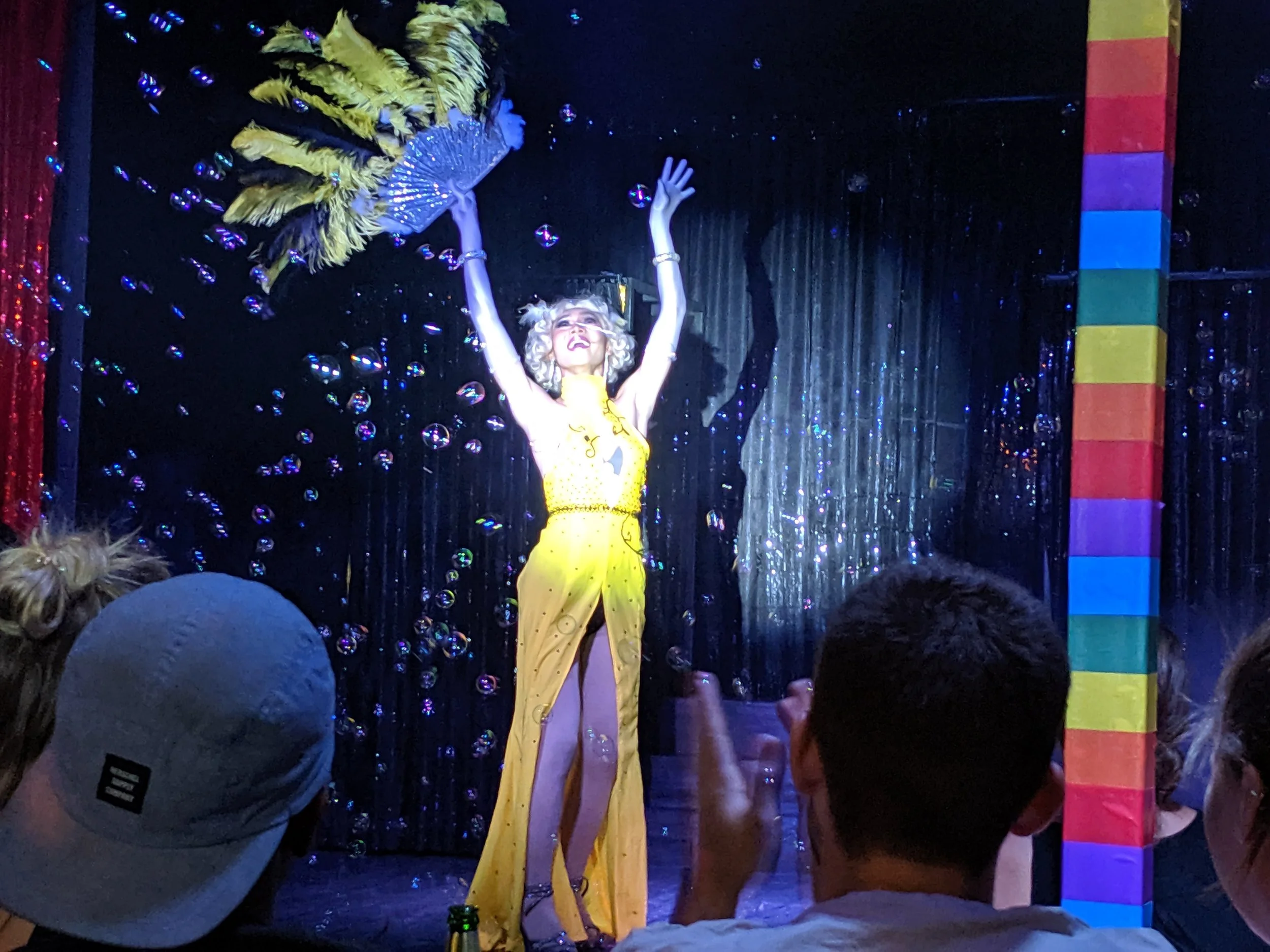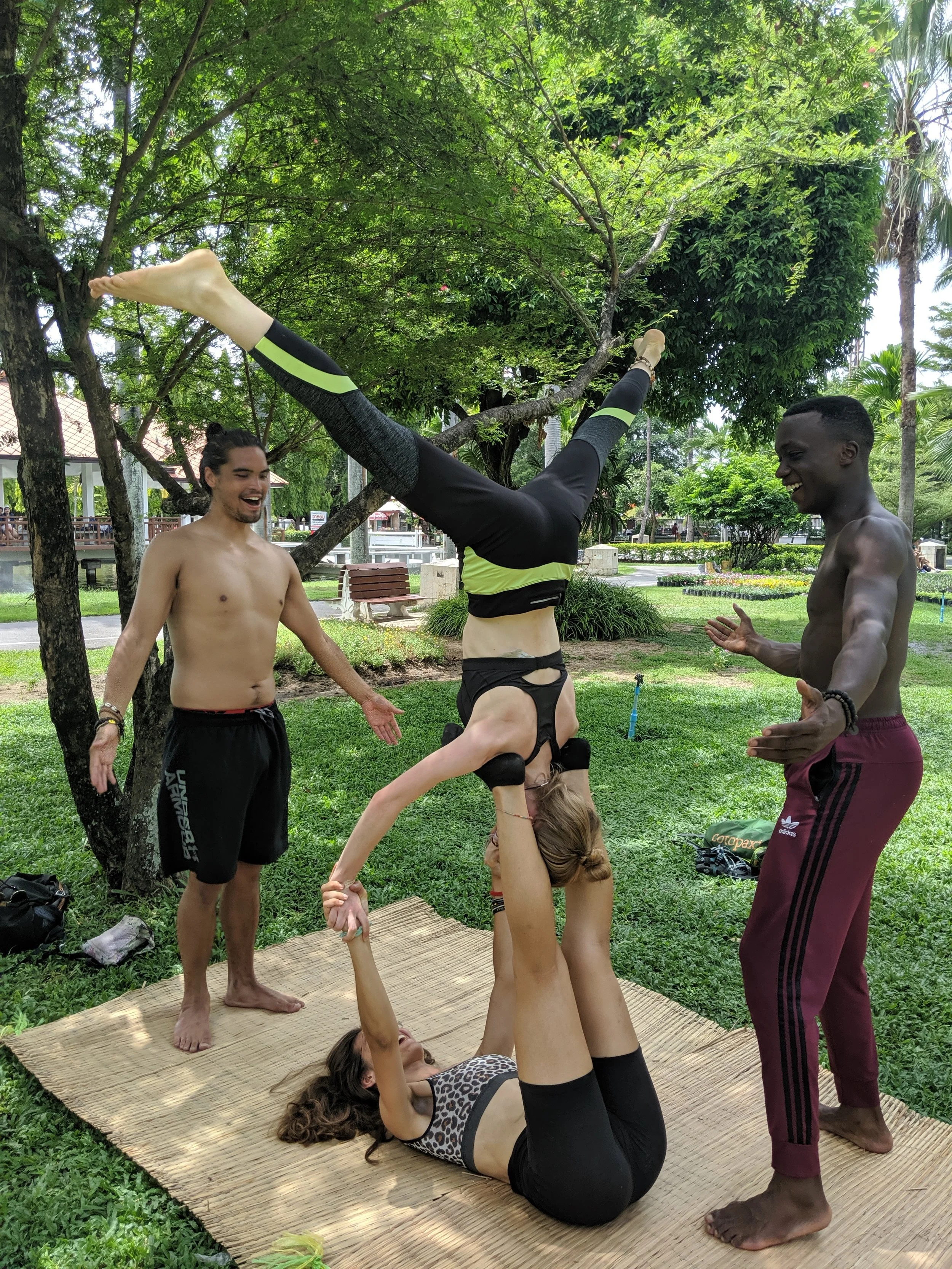July 9-15, Day 13-19
Writing on the train!
July 9
Took an overnight sleeper train up to the north. I felt like I was on an automatic watch roller at several points, constantly ambling, jostling, and waking up, but still decently comfortable for the cost (~$30) when you factor in saving a night of accommodations as well. The worst part was that I got fucking FEASTED by mosquitoes on the train somehow - I thought I was safe without DEET cause it’s a freaking train and now I’m suffering for that.
The hostel is in a convenient location but super empty, which is kinda shitty. Staying in touch with the Ayutthaya people at least though. From walking around, the Old City where I’m staying is super touristy, definitely catering to foreigners with rows of english cafes, restaurants, and massage parlors (mostly empty because of low season) packed together.
Met up with a few Ayutthaya people at the touristy drinking area. Got decently lit at the Thai reggae bar, which was a genre I was never expecting to experience - it was funny to see a Thai guy in dreads jamming out with a full band. The other bars are all interestingly themed playing hard techno (ft. German tourists), rock, and typical club bangers all packed into one block. There’s also a bunch of grandmas trying to sell roses and wristbands that say things like ‘I love dick salad’ to drunk tourists.
Thai reggae band (unfortunately no guy with dreads in this one).
Quick Thai History Lesson
Yay history
Some things I learned about Thai and Chiang Mai history after visiting a few museums that were in no way fact checked :)
Chiang Mai is a neat square formerly contained within four walls, interestingly modeled after the human body parts and organs. For example, the main temples and government buildings are at the navel, the east/west gates were considered like limbs bringing people into the city, whereas the southwest (the butt I guess...) was used as an exit for funeral processions and other unlucky things.
The city also linked 12 sacred Buddhist sites for pilgrimage and was a hub for the practice. Local Buddhism also evolved several times from the local practice from influence of Sukhothai and later Sri Lankan (ceylon) groups.
Thailand for years was split into multiple kingdoms, notably with Chiang Mai in the northern Lanna kingdom and Siam (Ayutthaya) to the south. Towards the end of the Mungrai dynasty (262 years), Chiang Mai declined in strength with conflicts between the king and nobles, and then conquered by the Burmese for 216 years. The Lanna overthrew the Burmese with the aid of Siam and became an independent vassal state for some time, serving as a buffer state in the many wars against Burma. It was interesting to see this after visiting Ayutthaya, which was totally razed by the Burmese and what precipitated the creation of Bangkok as the new capital.
Once the good ol’ colonization period began, Britain occupied Burma, and Siam fearing the same fate annexed Lanna (with good relations) to consolidate. It was forced concessions to Western powers, but remained the only Southeast Asian country to avoid direct rule. The country became modern Thailand in 1932 when it switched from absolute monarchy to a democracy, though they still clearly love their royalty.
Other tidbits:
There are several native Hill tribes, some who are migrants from neighboring countries
Apparently used to grow opium until the government banned it and turned them into fruit/veg plantations. Less regulated neighboring countries have taken to producing meth and other substances now though.
Roots in both Buddhism and animism, and follow the same zodiac as the Chinese, paying respect to their birth year animal
Lanna has a completely different language/alphabet from Thai. There is a lot of regional pride (and also lots of tourist stores that will throw in Lanna with most people not realizing what it actually means). I remember talking to someone about how native dialects like Taiwanese and Cantonese are slowly fading in lieu of Mandarin, and he said it was the same for Lanna.
July 10: Monk Chat
I’m a bit temple-d out after visiting so many in Bangkok and Ayutthaya, but watching evening chanting live at this one was still an awesome experience.
One thing I was excited for in northern Thailand was the opportunity to learn more about Buddhism. I’ve dabbled a bit with SF Zen Center but never really researched it. After reading about Monk Chats, where monks basically hold office hours at local temples, I jumped at the opportunity to speak with some of the enigmatic figures I had seen in the streets.
At Wat Suan Dok I spoke with a couple young monks, who were there to practice their English. There was also one who had studied Mandarin for three years and started gushing when he saw I was Chinese, while I struggled to tap into the canned phrases I memorized from my one year of the language. I learned a lot more about the monk life at later events, which I'll save for a dedicated post.
I also met Ian, a British man who worked at the temple university and shared his very interesting life story. He’s lived in Thailand for 24 years, turning 80 soon. When I asked what made him move he told me Thailand has always felt like home since he started visiting over 40 years ago. As a gay, dyslexic, slightly autistic person in the West, he’s always ‘felt like a failure’ by his family standards. He seemed pretty well connected, with either a sibling or close friend as some high level figure in the Hong Kong government - treasurer or secretary of something - but I didn’t want to pry. There was also a Muslim girl also attending and the three of us had interesting discourse about Buddhism as a set of life principles, irrespective of your religion, and its role in therapy and mental illness as meditation popularizes in the West.
Ian was nice enough to offer me a ride to my next destination, during which he lamented about the degradation of the university’s English and Monk Chat programs, which had he helped run. At one point we passed the Thai Monk Chat organizer and Ian quipped ‘you don’t know what you’re doing at all do you? And you’re the one in charge!’ To which he confusedly replied ‘oh yes, thank you’ - showcasing the lack of actual English ability of many of the participants. Ian talked about the lack of leadership and students who were actually committed to Buddhism. ‘That Lao student you were talking to is just there for the English education. Once he graduates he’ll hang his robes up. The worst part is that none of the teachers will fail any of the students here either.’
To him, Thais didn’t understand that just getting a degree for the resume bullet wouldn’t win them a job - ‘it gets you the interview, then you come in and everyone will realize you didn’t bloody learn to speak English’.
July 11
The city is weirdly empty during the day - so many stalls, vendors, and restaurants with workers sitting around with no business. More pedestrian and vehicle traffic late afternoon, I guess when people get off work or from their day trips to come back into old city. Being touristy isn’t a bad thing, but there’s a feeling of hollowness in low season that makes me not want to stay in the old city for an extended period of time. There's no sense of community even within my hostel.
It's also interesting to observe my attitude towards budgeting change as I adjust to Asia prices - will be minorly annoyed that I paid 70 Baht for a cab instead of walking and taking a 5B ferry, but in the end it’s literally 2 dollars and I would burn magnitudes more normally in SF.
Date with ‘P’
Ploen Ruedee Night Market. One of the more upscale, hip bazaars with live music and bougier stuff like rolled ice cream (worth).
Got dinner near the night bazaar with a Chiang Mai local. Like ‘F’, she also previously lived in the States, studying English in Boston at a language school. She works at two hotels doing business sales until 7pm everyday, though her longterm aspirations are in fashion. On top of full-time work, she’s starting her own clothing booth, with plans to curate designs from a wholesale vendor in Bangkok and resell to the many Chinese tourists near Nimman Road. It was ironic she explicitly chose to study Japanese over Chinese at school.
She mentioned that because the Thai economy isn’t great, her parents work multiple jobs and plan to sell cheesy fries at a nearby stall. Imagining vending together as a family affair was cute at first, but also a healthy privilege check. I’m reminded of the stark economic disparity everytime I order a full meal here for $3, but it resonates more when you hear someone’s personal circumstances. I’ve met so many people who can only dream of moving to the States, and I really am fortunate to have been born into so much more economic opportunity for less required effort.
July 12
Admiring nature - spontaneous adventures with random people you meet in the lobby are always great.
Changed hostels because my old one was still deserted, and made a new friend ‘B’ in the lobby within ten minutes of walking in. Functionally, the place has worse rooms and location but it’s honestly worth the ambiance and social aspect of the common area.
B is doing her master’s in conservation science and biology and does research on snakes, with a goal of destigmatizing the fear and bias (starting from Adam and Eve) we have against them. She’s been in Thailand to observe the biomes here and spent some time at a forest monastery for her program. It was invigorating to discuss the intersection between Buddhism and conservation efforts, given we’re both in the process of learning about the practice and I haven’t had to opportunity to discuss it with anyone thus far. Apparently she and her peers had an inquiry about how long leeches would stay on, and how big they could get, and ended up testing on themselves. Her’s was on for two hours...the things you do for science.
We went up to a mountainside temple and hiked a few trails around the area. It was fun to have her point out random plants and giant bugs I wouldn’t have noticed on my own and share science trivia.
Doi Suthep - a mountaintop temple with a beautiful view of Chiang Mai.
July 13: Into the Wild
Went to ‘Into the Wild’ elephant sanctuary today. Visiting elephant camps is one of the most popular tourist activities in Chiang Mai but often still controversial out of ethical concerns. Are the elephants retired ones used formerly for labor or entertainment, or bred into captivity? Do the mahouts use chains or hooks? Do people ride them?
My friend helped choose this specific camp so I hadn’t done much research, but enjoyed the nearly 45min talk that the camp owner gave to answer questions about ethics before we did any activities. Basically, the elephants he owned were purchased from indigenous hill tribes that have owned elephants for generations and used them for logging teak trees. He mentioned using them to butt down trees with their heads sounds cruel, which is why he decided to open camp for his give elephants, but to also consider the following points when thinking about ethics.
Got farted on shortly after this. At least they have healthy diets so it didn’t smell too bad :’)
Logging machinery can’t operate here due to the terrain, and these tribes typically have few other economic opportunities, and have elephants passed down within the family.
Him purchasing an elephant for ~1.8M baht (~$60k) gives them resources to pursue education or move elsewhere for work. He clarified that they would not use this to purchase more elephants because the money is divided across the family members.
Elephants have always been the beasts of burden in Thailand, for riding and for labor, just like horses, camels, oxen, or mules anywhere else. It’s part of the culture, just like factory farming and eating meat, bullfighting, or horse racing might be in our own. He mentioned that riding an elephant isn’t particularly unethical or painful when compared to riding a horse, but that consumer preferences are still changing over time, and he doesn’t do it at his camp.
The argument can be made that wild animals should only belong in the wild, and not kept for human interaction, but he mentioned that there is almost no remaining natural habitat for these elephants to go to, they were raised in captivity and are already dependent on humans, and if let loose could roam into a town and cause trouble in search for food.
On the topic of profiting off of the animals, he had no qualms admitting the camp in the end is still a business. He also talked about the extreme costs of renting the land, preparing the inordinate amount of food elephants eat, hiring local villagers, and the personal dedication he had made, quitting a longterm government job as a vet and working everyday to keep the operation going. The deep-rooted cynic in me could be skeptical on some point, but he seemed pretty genuine.
The rest of the time was spent feeding the elephants, going on a short hike, mud bathing, then washing off with them - definitely a curated tourist experience but still amazing to interact with the animals nonetheless. Highlights include watching one poop into the water (which thankfully float) and one of the locals chuck each giant turd out of the pool, and seeing the baby elephants fully submerge underwater and stick their trunks out as snorkels. Must be handy.
That night I also saw a ladyboy cabaret show at night with some hostel people, which included some very convincing performers lipsyncing and doing choreo in crazy costumes. At one point of the of performers stepped onto our table in giant heels and jumped off landing into the splits... Apparently at other shows they’ll ‘volunteer’ some guys from the audience for lap dances, stripping, and some other shenanigans. We sat in the back corner just to be safe.
July 14
Did a free morning yoga class in the park, which then turned into an impromptu acroyoga jam session which B started. I can see how Chiang Mai is a good expat city, with its chill ambience, readily available hipster cafes, and lifestyle activities like the daily yoga class. I was also impressed by B’s ability to kick it off, especially given only one other person had any acro experience - the ability to rally strangers and make everyone feel included is admirable.
Went to the Sunday night market as well, which is the largest out of all the ones in the city. I walked around for over an hour and a half and still didn’t everything, but there’s an insane amount of hand made crafts, souvenirs, clothing, and food to peruse.

